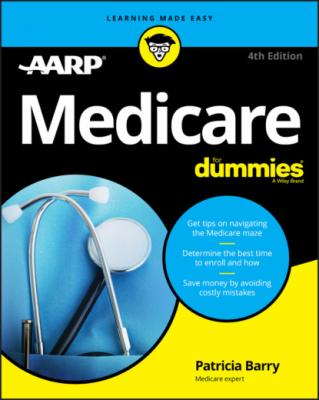Medicare For Dummies. Patricia Barry
Чтение книги онлайн.
Читать онлайн книгу Medicare For Dummies - Patricia Barry страница 19

If your income is limited, contact the nonprofit organization Rebuilding Together, which provides volunteers to make housing repairs and install safety equipment free of charge. Call 800-473-4229 or go to http://rebuildingtogether.org for local information.
If you file itemized tax returns, you may be able to deduct the costs of home improvements for medical reasons, as I indicate in Chapter 4.
Nursing home care
Many people are surprised, and often alarmed, to discover that Medicare doesn’t cover long-term care in nursing homes. I’m not talking here about short-term stays in a skilled nursing facility (most of which are nursing homes) after leaving the hospital; Medicare does cover those stays in specific circumstances. (I describe this kind of skilled nursing care earlier in this chapter and explain the ins and outs of qualifying for it in Chapter 14.)
But what if you become too sick or incapacitated to live at home and need the constant long-term care that a nursing home provides? Medicare will continue to cover your medical needs, but it won’t pay for what it calls custodial care, which refers to help with the activities of daily life such as using the bathroom, dressing, and so on. Nor will Medicare pay for your room and meals in a nursing home. These same rules apply to assisted living facilities.
Most people living in nursing homes pay for their custodial care out-of-pocket — with the help of long-term-care insurance, if they’ve purchased it — until their resources run dry. At that point, they usually become eligible for Medicaid, the state-run health-care system for people with very limited incomes and resources, which does pay the custodial care bills of people who qualify. (Because of the similarity in names, many people confuse Medicare and Medicaid, especially when it comes to thinking about long-term care.)
Eligibility rules for Medicaid vary from state to state. (And the name of the program is different in some states — for example, MediCal in California, MassHealth in Massachusetts, and TennCare in Tennessee.) To find out how the rules apply to you or a family member, you may need to consult an informed counselor or a qualified elder care attorney.
www.medicare.gov/Pubs/pdf/02174-Nursing-Home-Other-Long-Term-Services.pdf. You can also visit www.medicare.gov/nursinghomecompare/search.html.
Medical services abroad
Medicare doesn’t pay for medical services outside of the United States and its territories except in these extremely rare circumstances:
You’re traveling between Alaska and another state and have a medical emergency that means you must be treated in Canada.
A medical emergency occurs while you’re in the United States or its territories, but the nearest hospital is in a foreign country — for example, across the border in Canada or Mexico.
You live within the United States or its territories and need hospital care (regardless of whether it’s an emergency), but your nearest hospital is in a foreign country.
Some Medigap supplemental insurance policies (those labeled C, D, F, G, M, or N) cover emergency or urgently needed treatment abroad. (I explain Medigap insurance in Chapter 4.) In this situation, you pay a $250 deductible and 20 percent of the cost of the medical services you use up to a lifetime maximum of $50,000. Some Medicare Advantage plans also cover emergencies abroad, and so do some employer benefits and TRICARE military benefits. But otherwise, you need to buy travel insurance that includes medical emergencies when planning journeys abroad.
www.aaro.org), which has long lobbied Congress to make Medicare available abroad. AARO offers its members access to a variety of private health insurance plans that can be used in many countries. (You may be able to enroll in Medicare while living abroad, however; turn to Chapter 6 for important information about this kind of enrollment.)
Services that may be nice but aren’t necessary
You probably aren’t surprised to know that you can’t get a face-lift or a tummy tuck at taxpayers’ expense. Surgery solely for cosmetic purposes is one of the absolute no-no’s of Medicare coverage. (Medicare does cover bariatric surgery to reduce the size of the stomach in very obese people, but this procedure is to lessen their risk of serious health disorders and not to improve their looks.)
Acupuncture and other alternative medical practices are barred under traditional Medicare. Physical fitness classes and gym memberships are also excluded. But some of these services (notably gym memberships) are covered as extras in some Medicare Advantage plans.
Even something as relatively mainstream as chiropractic care may be excluded from Medicare coverage in many circumstances. Chiropractors help lessen the pain of spine and joint problems, most often by the manipulation of bones. Medicare covers manipulative treatment from a licensed chiropractic physician when you’re injured or in pain because of a problem with the spine, provided that the treatment is clearly improving your condition. But Medicare doesn’t pay for the manipulation of other joints (such as shoulders and knees) or for other types of chiropractic care such as massage or traction. And it doesn’t pay for maintenance care to keep you stable if you aren’t demonstrably improving.
Finally, in the hospital, Medicare doesn’t cover a private room (unless sharing one would be medically inadvisable), private nursing, or conveniences like a telephone or television if these items are billed separately.
Distinguishing When Coverage Comes with Limits
If you’ve had a hip replacement but fall again and need another, Medicare isn’t going to turn around and deny you coverage for the second one. If you’re fighting your third bout of pneumonia, Medicare isn’t going to shut you out of the hospital because of the first two episodes. If you’re in your 90s and have heart failure or cancer, Medicare isn’t going to refuse you treatment because you’re too old. For all the loose and cruelly inaccurate talk about “death panels” and “rationing” that still circulates in mass emails meant to exploit older people’s fears of being denied coverage, Medicare simply doesn’t — and can’t,